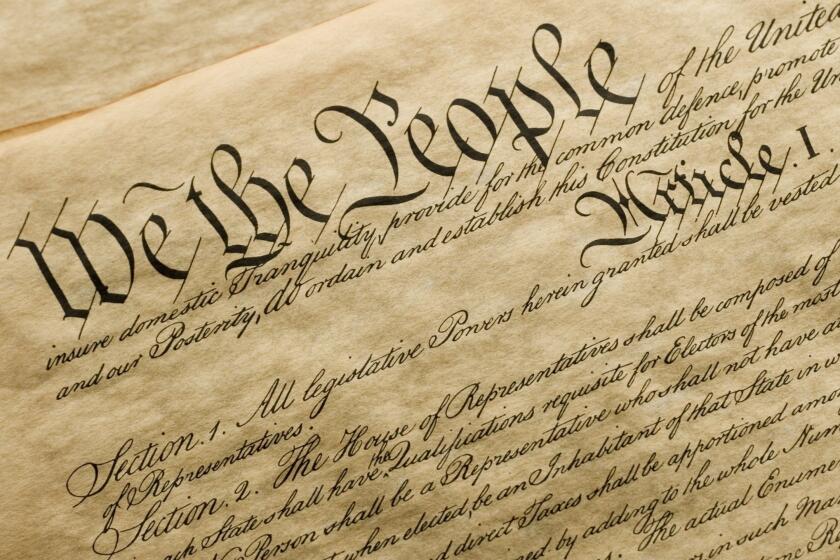‘Cancel culture’ is complicated. PEN America’s CEO has a plan for that
- Share via
Debates over speech have roiled academia, news organizations, social media and many workplaces in a time of extreme polarization and activism for racial justice. As arguments over so-called cancel culture have flared up in the last few years, PEN America, an organization that defends persecuted writers, has found itself advocating for free speech whenever and wherever it can. The group’s chief executive, Suzanne Nossel, unpacks her approach in a new book, “Dare to Speak: Defending Free Speech for All.” A former State Department diplomat, she looks beyond the finger-wagging to propose concrete ways to reconcile speech disputes without resorting to silencing. She spoke with The Times via Zoom from a vacation rental in Cape Cod, Mass., in a conversation transcribed by Mariah Kreutter and edited for clarity and length.
Why did you write this book?
It grew out of a sense that our country was becoming locked into a whole series of pitched debates over free speech that in my mind were sort of miscast, misguided, needlessly contentious and fractious. There has been this growing cleavage between the movement for equality, inclusivity, antiracism and bringing about a more progressive and just society, and the sense that that was being pitted against robust protections for free speech and academic freedom. That gave me grave concern, because I believe fundamentally in both sets of principles, and that they can and must be reconciled.
One of the strongest counterarguments to unfettered inquiry is that there are some ideas that could actually cause harm — emotional and psychic harm and yes, even trauma.
There’s some validity to it. I have a chapter where I talk in depth about the harms of speech, and I believe fundamentally that defenders of free speech need to be forthright in owning up to those harms. And there is evidence that even micro-aggressions can undercut someone’s sense of self and inflict psychological damage. You have to take those claims seriously, but that still does not mandate a repressive, suppressive approach to speech. Taboos against racial slurs and just mendacious, demeaning, derogatory speech — I think those taboos are very important.
The reason why I think it’s perilous to go down the path of using those harms as a justification to suppress speech is that while we can all agree on the most extreme examples — for example, the intentional use of a racial slur — there’s so many examples of speech that can feel hurtful and yet do constitute a legitimate part of our debate. One example that comes up a lot on campus is the Israeli-Palestinian conflict.
People love to claim the 1st Amendment to protect speech they favor, but resist similar safeguards for expression they dislike.
How do we improve the ways we are understood and the ways we listen?
We each have to be our own editor. Years ago, before something made it out into the public realm, it would go through layers of editors and fact checkers and copy editors. In many realms, that’s been swept away, and so the obligation falls to us to be our own editor — in some instances, to check with people who might represent different audiences.
I also set out a series of obligations for listeners: One is taking into account intent and context. Social media sort of cuts against that, in that there is a premium placed on the instantaneous, witty, pithy reaction. That contributes to this escalatory dynamic of contentiousness in our discourse. I think if you can stop and take a step back, very often, a more moderate reaction might be justified.
You lay out three principles for forgiving speech-related transgressions. Could you walk us through them?
The first is persuasive contrition. I think a lot of people trip up here, because they don’t actually believe they’ve done anything wrong. We had a vivid example with Rep. Ted Yoho [R-Fla.] apologizing to Rep. Alexandria Ocasio-Cortez [D-N.Y.] and using the opportunity to trumpet all of his work on behalf of the poor and why he’s a good person. And not owning up to his really noxious and incendiary remarks toward her.
I also think the person’s track record comes into it. When there are character witnesses who can actually say, “Look, I’ve worked with this person, we’ve collaborated on things. They’ve been a supporter of our cause,” that can help set the stage for forgiveness.
And then the third prerequisite is earning rather than expecting absolution and not making your apology with the anticipation that all of the heat will immediately dissipate. Thinking about what you might be able to do that will show that you’re trying to educate yourself.
In the second half of your book, you express skepticism about governmental regulation or tech platform involvement or, frankly, corporate control on speech. Tell us why.
When you expand the authority of government to regulate speech, it will be used in self-serving ways. Donald Trump is a perfect illustration of this. If you think about how he has used his powers over speech — whether it’s to threaten journalists who ask critical questions, to try to suppress books that are exposés of wrongdoing or [to send] out federal troops who target protesters in cities across the country — this is what a misguided leader will do if he has the authority to clamp down on speech.
The prominent theorist and author of “The First” also tackles Twitter and deep fakes — and asks if the 1st Amendment is obsolete.
Corporations restrict speech all the time in 100 different ways, and social media companies moderate their platforms aggressively. We shouldn’t give them unfettered discretion. One of the things I argue for is this idea of a global content defender service. I expect fully that the companies will have to become far more aggressive in policing speech; as we go down that path, we need to put in more fail-safes to protect against the inevitable false positives — speech that is legitimate that shouldn’t be flagged by an algorithm.
What’s been your favorite free speech controversy of the last year?
Not exactly funny, but strange bedfellows, where we find ourselves staunchly defending John Bolton and his right to publish his book. I mean, he is somebody that I — in my career as a diplomat and otherwise — have vociferously argued against at every turn. And yet I think he absolutely had a right to publish this book. And that for the Trump administration to try to get it halted when it was virtually on bookstore shelves was censorious and dangerous.
I have to ask, of course, about the Harper’s letter. What did you make of it?
Full disclosure: My husband, the historian David Greenberg, was one of the signatories. I saw the letter as a genuine effort to spotlight concerns over unwarranted punishments for speech and the importance of ensuring that essential pushes toward equality, inclusion and antiracism not veer into intolerance of those who question orthodoxies, misspeak or are otherwise seen as less than fully supportive of the cause. It was released at a fraught moment, and I think some read it to prioritize the danger of encroachments on speech over the positives of having groups and individuals previously excluded from discourse be able to raise their voices for the first time or with new potency. Ultimately, I think these two causes are not mutually exclusive.
“Cancel culture” has been with us since this country began — did anyone actually see “Hamilton”? So why is a group of esteemed writers wringing hands about the way a new generation uses it?
Crucial to the argument is that jobs are being lost over this. What do you make of James Bennet’s departure as editorial page editor of the New York Times after publishing the Tom Cotton op-ed?
At one level I find it disturbing when individuals are essentially pushed out of their jobs for editorial mistakes, because I think people need the space to make mistakes, and if they are genuinely contrite, there should be space to make amends. The one piece of it that does sort of stick with me is that James Bennet didn’t read the piece before it was published. Because that piece was published at such a pitched moment in our history, the country was teetering on the brink of a very aggressive, militarized crackdown on peaceful protests. And at a moment like that, when you’re in charge of an organization or a publication, you have to be very careful and thoughtful about what you’re putting out.
What about Bari Weiss’ noisy resignation?
It’s important for a major newspaper like the New York Times to put forward a breadth of opinions on its editorial pages. And I know the Times has made an effort to do that. I do think some environments have become inhospitable to people who depart from a certain set of viewpoints that are widely accepted and that it should be the responsibility of the institution to try to foster reasoned dialogue so that people can talk with one another. And I think that’s made harder by the pandemic. Might this have been different if people were still going into an office to deliberate with one another face to face?
More to Read
Sign up for our Book Club newsletter
Get the latest news, events and more from the Los Angeles Times Book Club, and help us get L.A. reading and talking.
You may occasionally receive promotional content from the Los Angeles Times.












